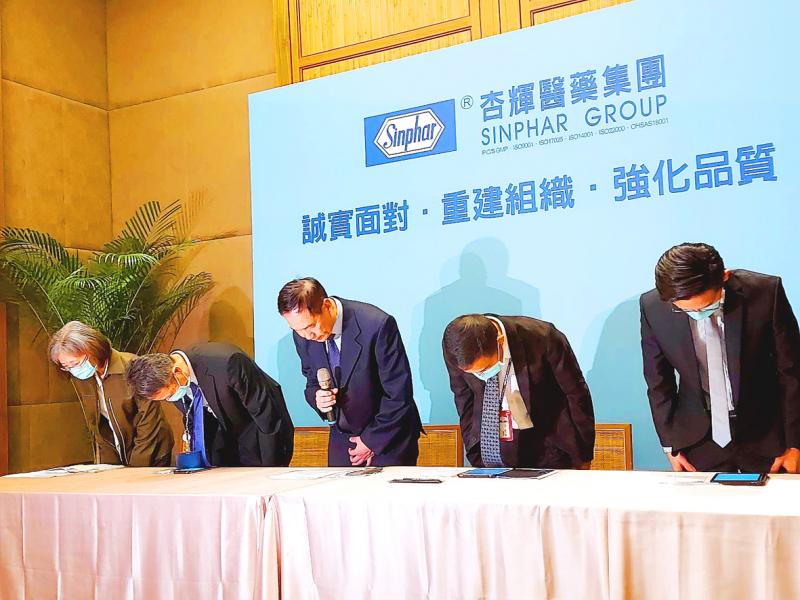Sinphar Pharmaceutical Co Ltd (杏輝) yesterday apologized to the public for quality problems in 23 kinds of drugs, saying that it plans to recall all of them within the next two months.
The recall is expected to result in revenue losses of NT$28 million (US$966,684), accounting for 2.32 percent of its revenue in the first half of this year, Sinphar said in a filing with the Taiwan Stock Exchange.
The company said that it expected to be fined NT$30,000 to NT$2 million.

Photo: Chen Yung-chi, Taipei Times
Sinphar last week examined all of its 288 drug lines after the Food and Drug Administration (FDA) found in a regular examination in July that six of its drugs had quality issues.
In stability tests, which show how the quality of a drug varies over time under the influence of environmental factors, the six were found to have less than 90 percent of their labeled potency, which meant they failed the tests, the administration’s data showed.
The agency demanded that Sinphar stop selling the six and recall them, to safeguard the interests of consumers.
“As the event has harmed our reputation, we decided to run a comprehensive inspection on all of our products to find out whether other products had the same quality issues,” Sinphar spokesperson Amy Lou (樓怡美) said.
The company found that another 17 drugs had less than 90 percent of their labeled potency and would recall them, Lou said.
The reduction of the drugs’ potency could be attributed to the manner in which they are packaged, as the firm packaged some of its ointments in plastic bottles instead of aluminum tubes, making it easier for the chemicals to evaporate, she said.
Meanwhile, some drugs’ potency weakens due to improper storage methods, the firm said.
For example, it recommends that its ointment for hemorrhoids be stored at room temperature, which can accelerate the chemical reaction between different ingredients, the company said, adding that it is considering changing the ointment’s label and asking users to store the product in the refrigerator.

KEEPING UP: The acquisition of a cleanroom in Taiwan would enable Micron to increase production in a market where demand continues to outpace supply, a Micron official said Micron Technology Inc has signed a letter of intent to buy a fabrication site in Taiwan from Powerchip Semiconductor Manufacturing Corp (力積電) for US$1.8 billion to expand its production of memory chips. Micron would take control of the P5 site in Miaoli County’s Tongluo Township (銅鑼) and plans to ramp up DRAM production in phases after the transaction closes in the second quarter, the company said in a statement on Saturday. The acquisition includes an existing 12 inch fab cleanroom of 27,871m2 and would further position Micron to address growing global demand for memory solutions, the company said. Micron expects the transaction to

Nvidia Corp’s GB300 platform is expected to account for 70 to 80 percent of global artificial intelligence (AI) server rack shipments this year, while adoption of its next-generation Vera Rubin 200 platform is to gradually gain momentum after the third quarter of the year, TrendForce Corp (集邦科技) said. Servers based on Nvidia’s GB300 chips entered mass production last quarter and they are expected to become the mainstay models for Taiwanese server manufacturers this year, Trendforce analyst Frank Kung (龔明德) said in an interview. This year is expected to be a breakout year for AI servers based on a variety of chips, as

Global semiconductor stocks advanced yesterday, as comments by Nvidia Corp chief executive officer Jensen Huang (黃仁勳) at Davos, Switzerland, helped reinforce investor enthusiasm for artificial intelligence (AI). Samsung Electronics Co gained as much as 5 percent to an all-time high, helping drive South Korea’s benchmark KOSPI above 5,000 for the first time. That came after the Philadelphia Semiconductor Index rose more than 3 percent to a fresh record on Wednesday, with a boost from Nvidia. The gains came amid broad risk-on trade after US President Donald Trump withdrew his threat of tariffs on some European nations over backing for Greenland. Huang further

Sweeping policy changes under US Secretary of Health and Human Services Robert F. Kennedy Jr are having a chilling effect on vaccine makers as anti-vaccine rhetoric has turned into concrete changes in inoculation schedules and recommendations, investors and executives said. The administration of US President Donald Trump has in the past year upended vaccine recommendations, with the country last month ending its longstanding guidance that all children receive inoculations against flu, hepatitis A and other diseases. The unprecedented changes have led to diminished vaccine usage, hurt the investment case for some biotechs, and created a drag that would likely dent revenues and